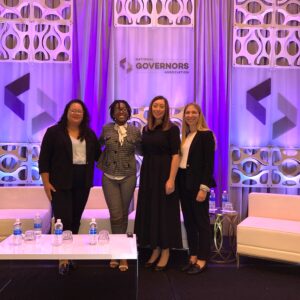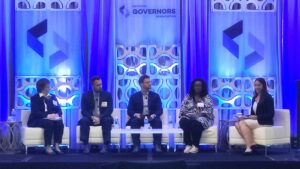NGA convened Governors’ education policy advisors in Milwaukee, Wisconsin to share gubernatorial education strategies with each other and learn from national and state experts through panel conversations and small group discussions.
The National Governors Association (NGA) hosted a bipartisan mix of 26 Governors’ policy advisors from 21 states and territories for the annual Governors’ Education Policy Advisors Institute in Milwaukee, Wisconsin from October 3-5, 2023. Throughout the Institute, Governors’ advisors and national and state experts continued the important discussions that began in May in Pheonix, Arizona at the NGA K-12 Education Summit. Throughout the Institute, Governors’ advisors and external experts shared promising practices related to Governors’ top K-12 education priorities, including academic supports, educator workforce and student, family and school staff well-being. Governors’ offices also had an opportunity to hear from teacher, student, and parent voices about their firsthand experiences within the education system.
Brittney Cummins, Education Advisor to Utah Governor Spencer Cox, NGA’s 2023-2024 Chair, and Tammi Hiler, Special Advisor of Education and Early Childhood to Colorado Governor Jared Polis, NGA’s 2023-2024 Vice-Chair, opened the Institute by sharing an overview of Governor Cox’s 2023-2024 NGA Chair’s Initiative, “Disagree Better,” an effort to show that as Americans, we can work through our differences to find solutions to the most difficult problems facing our states and our nation.
Educator and Student Voice
The first session began with voices from the field including Sarah Kopplin, 2023 Wisconsin Teacher of the Year; Loren Muwonge, a high school senior and district 2 commissioner of the Milwaukee County Youth Commission; and Yoslin Amaya Hernandez, a student advocacy coordinator at Generation Hope. Each panelist shared their unique experiences in the classroom, while discussing factors that directly affect their education experiences including mental health, school safety and educator development and support. Panelists concluded the session by emphasizing the importance of engaging student, teacher, and parent voices within the decision-making process at all levels.
Student, Family, and School Staff Mental Health and Well-Being
Governors’ offices had the opportunity to hear from panelists, as well as engage in small group discussions surrounding student, family, and school staff mental health and well-being.
First, Inseparable’s Angela Kimball, The Jed Foundation’s Dr. Zainab Okolo and Dr. Sheila Smith from the National Center for Children in Poverty discussed the importance of ensuring mental health and well-being is at the forefront of conversations in education.
Shannon Desilets and Austin Brown from New Hampshire shared Governor Sununu’s efforts to comprehensively address school safety through a public safety and mental health and well-being approach, including the creation of a cross-agency School Safety Preparedness Task Force. New Hampshire, along with four other states, will continue to work on student and staff well-being through NGA’s technical assistance project addressing this issue. In a breakout session focused on the intersection of student well-being and parent, family, and community engagement, attendees also heard from Joan Wasser Gish of the Mary E. Walsh Center for Thriving Children, regarding the importance of integrated student and wraparound supports for academic success.
Academic Supports: Literacy and Learning
The Institute also featured a session on academic and literacy supports and strategies from early childhood through adulthood. The session led off with Dr. Carey Wright, former State Superintendent of Mississippi and current Maryland State Superintendent of Schools, sharing Mississippi’s comprehensive efforts to advance early literacy. Dr. Jennifer McCombs of the Learning Policy Institute then provided an overview of the Wallace Foundation’s research on high-quality summer learning and enrichment programs, including findings from a recent report, National Call to Action for Summer Learning: How Did States Respond?. Laura Bornfreund of New America next shared the current research on kindergarten as a key foundational element for school readiness and success. Lastly, Charles Bradford of Literacy Services of Wisconsin shared an overview of the current landscape of adult literacy and strategies for providing increased adult education supports.
Fireside Chat with Paul Reville on Developing A State Education Policy Agenda
The second day of the Institute opened with a fireside chat with Paul Reville, the Francis Keppel Professor of Practice of Educational Policy and Administration at the Harvard Graduate School of Education, the Founding Director of Harvard’s Education Redesign Lab and the former Massachusetts Secretary of Education from 2008 to 2013. Reville discussed key elements of building an effective education policy agenda and the top issues affecting education today including mental health and well-being, chronic absenteeism and the importance of cross-agency collaboration to support the holistic needs of students, families and communities.
Educator Workforce
Recruiting and retaining a high-quality and diverse educator workforce is a top priority for Governors across the country. As such, the Institute concluded with David Donaldson of National Center For Grow Your Own, Dr. Constance Lindsay of University of North Carolina’s School of Education, Linda Smith of the Bipartisan Policy Center and Dr. Nick Yoder of American Institutes for Research sharing strategies for educator recruitment and retention. Donaldson provided an overview of Grow Your Own models and registered educator apprenticeships across the country with Smith lifting up registered apprenticeships as a pathway for early childhood educators as well. Dr. Lindsay discussed research on the impact of principals and school leaders on student learning, educator retention, and school and Dr. Yoder highlighted educator well-being as an instrumental factor in recruitment and retention.
The 2023 Governors’ Education Policy Advisors Institute provided a forum for Governors’ policy advisors to learn from each other and national and state experts on promising practices, common challenges, and top education priorities for Governors across the country. Please visit NGA’s K-12 Education page for ongoing updates.
For more information on this topic, please contact Seth Gerson (sgerson@nga.org) or Jillian Meinhardt (jmeinhardt@nga.org).















